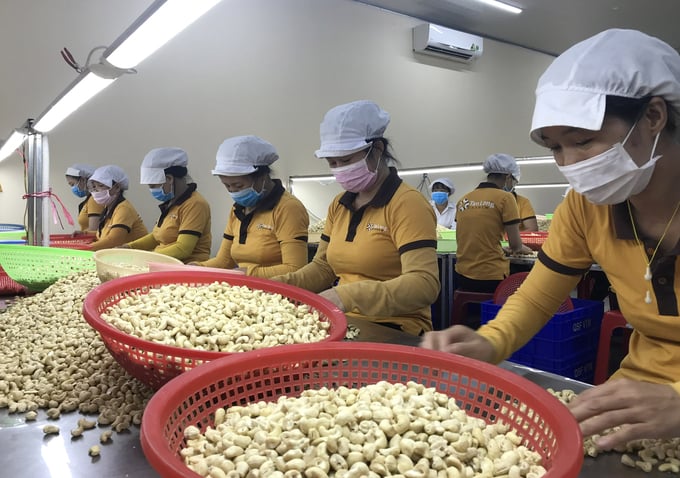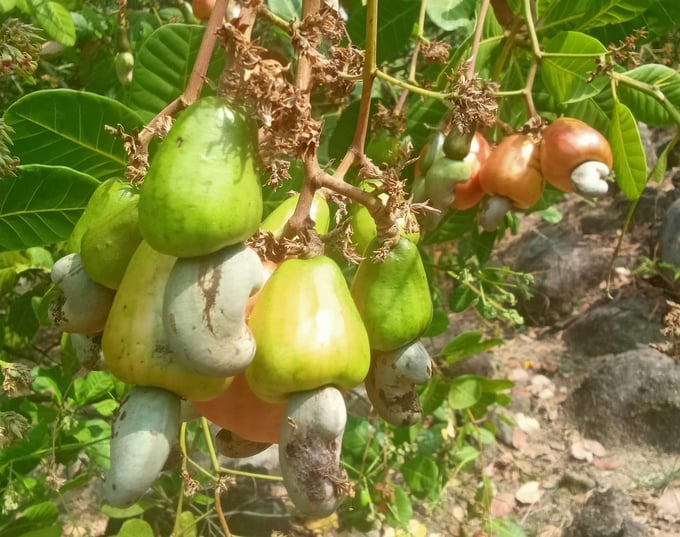November 18, 2025 | 23:45 GMT +7
November 18, 2025 | 23:45 GMT +7
Hotline: 0913.378.918
November 18, 2025 | 23:45 GMT +7
Hotline: 0913.378.918

Processing cashew kernels at a Dong Nai factory. Photo: Son Trang.
The Vietnamese cashew industry, grappling with declining quality and food safety concerns, faces warnings from international associations and importers. The Vietnam Cashew Association (Vinacas) is actively addressing these issues, providing technical solutions and urging strict food safety controls to regain the world market's trust in Vietnamese cashew nuts by 2024.
In October 2023, Vietnam set a new record for cashew exports, reaching 64 thousand tons valued at 358 million USD, reflecting a 47.7% increase in volume and a 37.1% increase in value compared to October 2022. Over the first 10 months of 2023, cashew exports from Vietnam totaled approximately 517 thousand tons, valued at 2.95 billion USD, marking a 21.8% volume increase and a 15.9% value increase compared to the same period last year.
An apparent trend observed in data from the General Department of Customs is the notable difference between volume growth and export turnover growth. This discrepancy can be attributed to a considerable decline in the price of exported cashew nuts this year. Specifically, the average price of cashew nuts exported in the first 10 months of the year was 5,703 USD/ton, reflecting a 4.8% decrease compared to the same period in 2022.
One significant factor contributing to the drop in cashew export prices is related to concerns about food safety. Vinacas reports that there have been complaints and warnings from customers and markets regarding the quality of numerous shipments of Vietnamese cashew nuts. Notably, the Chairman of the UK Nut and Dried Fruit Association expressed concerns in a letter to Vinacas about the rising incidence of live insect contamination in many Vietnamese cashew export shipments to Europe.
The American Nut and Food Industry Association, along with several major importers, have communicated their apprehensions to the Vietnamese cashew industry, cautioning about a perceived decline in the quality of Vietnamese cashew nuts. Key issues raised include the presence of moths (insects) in cashew nuts, pesticide residues, and unidentified impurities. Mr. Pham Van Cong, Chairman of Vinacas, affirmed that the significant decrease in Vietnam's cashew export prices is attributed to food safety concerns. Recently, due to subpar food safety standards, the price of Vietnamese cashew nuts in the export market has fallen below that of Indian cashew nuts.

Cashew in Binh Phuoc. Photo: Son Trang.
Mr. Bach Khanh Nhut, Vice President of Vinacas, outlined several reasons contributing to food safety concerns in exported cashew shipments. The late months of the year, marked by heavy rain, make cashew nuts prone to mold and insect infestation. To counteract insects, factories resort to disinfectants. However, increased delivery pressure has led to chemical residues in many shipments due to inadequate post-sterilization measures. Additionally, the necessity to ramp up production to meet heightened year-end import demand has resulted in less stringent food safety controls in some cashew processing facilities.
The necessity to escalate production to meet heightened year-end import demands has resulted in a relaxation of food safety controls in some cashew processing factories. Confronted with this situation, Vinacas has been proactively issuing regular food safety warnings to businesses, accompanied by technical solutions for swiftly addressing worms, weevils, and insects residing in cashew nuts. These measures aim to be effective while still upholding stringent food safety standards.
In response to the challenges, Mr. Pham Van Cong emphasized the importance of competent authorities in provinces with cashew processing industries conducting regular inspections and supervision to ensure food safety within these factories. This commitment to food safety and hygiene in cashew processing facilities is vital for maintaining the reputation of Vietnamese cashew nuts and other local export products on the global stage.
Mr. Cong affirmed, "If stringent food safety measures are rigorously enforced in cashew processing factories, by 2024, the cashew industry can reclaim the esteemed reputation of Vietnamese cashew nuts in the world market."
Dr. Phan Thi Thu Hien, Director of the Center for Post-Import Plant Quarantine II (Department of Plant Protection), highlighted the increasing stringency of plant quarantine regulations in the EU and other markets for agricultural and food products. The EU, for instance, has raised its sampling rate from 5% to 10% and further to 20%. Notably, common pests in Vietnam, such as fruit flies, whiteflies, and thrips, are now subject to plant quarantine in the EU and other markets, underscoring the urgency for enhanced quality control in the cashew industry.
Translated by Quynh Chi

(VAN) SEIKI Group envisions itself as a pioneer in the ‘dual transformation’ of digital technology and green industry, standing alongside the Government and Vietnamese businesses in their pursuit of sustainable development.

(VAN) The VNGEONET network affirms Viet Nam's progress in mastering digital space, providing a precise positioning data platform to serve socioeconomic development.
/2025/11/14/3247-1-184556_35.jpg)
(VAN) Thai Nguyen is methodically implementing digital transformation in the livestock sector, laying the foundation for a modern, transparent, and sustainable agriculture.

(VAN) The year 2025 marks 80 years of development of the Agriculture and Environment sector, a proud journey with significant progress in production, integration and sustainable growth.

(VAN) De Heus continues to steadfastly pursue sustainable development, building linked value chains with farmers and businesses in Viet Nam.

(VAN) From the rich lands of Co Do (Can Tho), an enterprise is amplifying the value of the clean rice grain, a symbol of the vitality and pride of the Mekong Delta.

(VAN) The Vietnamese irrigation sector has undergone a remarkable transformation, becoming a proactive force in disaster prevention, climate adaptation, and risk management in the era of climate change.